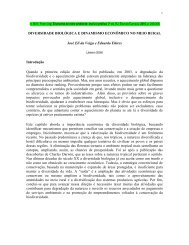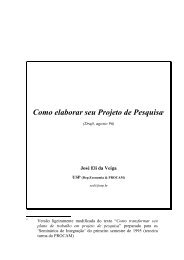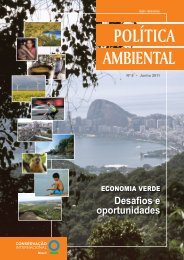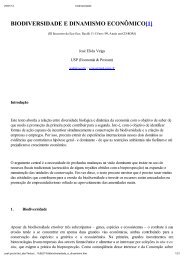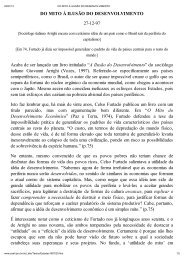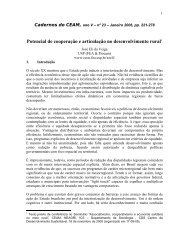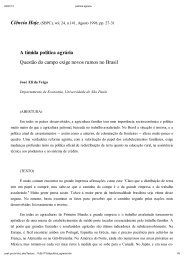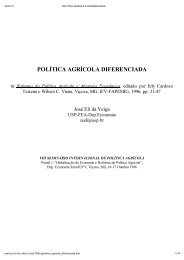sustainable development 20 years on from the ... - José Eli da Veiga
sustainable development 20 years on from the ... - José Eli da Veiga
sustainable development 20 years on from the ... - José Eli da Veiga
Create successful ePaper yourself
Turn your PDF publications into a flip-book with our unique Google optimized e-Paper software.
81<br />
The issues that <strong>the</strong> regi<strong>on</strong>’s cities will have to address in <strong>the</strong> coming <str<strong>on</strong>g>years</str<strong>on</strong>g> are rooted in <strong>the</strong> same<br />
safety and envir<strong>on</strong>mental protecti<strong>on</strong> issues that it has grappled with in <strong>the</strong> past. And <strong>the</strong>se issues are<br />
compounded by <strong>the</strong> effects of climate change and <strong>the</strong> growing demand for products and services<br />
attributable, am<strong>on</strong>g o<strong>the</strong>r factors, to rising incomes. The c<strong>on</strong>figurati<strong>on</strong> of urban infrastructure and <strong>the</strong> way<br />
in which investments (in <strong>the</strong> water supply, sanitati<strong>on</strong>, waste management, energy mobility, food<br />
distributi<strong>on</strong>) are evaluated will go a l<strong>on</strong>g way towards determining <strong>the</strong> impact of human activity <strong>on</strong> <strong>the</strong><br />
envir<strong>on</strong>ment and vice versa. At <strong>the</strong> moment, existing structures are not c<strong>on</strong>ducive to efficient resource<br />
use; nor are <strong>the</strong>y designed with any c<strong>on</strong>cern for disaster-resistance. The applicati<strong>on</strong> of <strong>the</strong> c<strong>on</strong>cept of ecoefficiency<br />
in <strong>the</strong> evaluati<strong>on</strong> of investments (see box I.7) could serve as a useful frame of reference for<br />
improvements in this respect. The same applies to mainstreaming disaster risk reducti<strong>on</strong> into decisi<strong>on</strong>making<br />
criteria relating to public investment (see box I.3).<br />
There is a great deal of interest —not <strong>on</strong>ly in <strong>the</strong> regi<strong>on</strong>, but around <strong>the</strong> world— in <strong>the</strong> extremely<br />
promising possibility of reproducing <strong>the</strong> success stories of cities that have managed to encourage<br />
investment in envir<strong>on</strong>mentally friendly, spatially and energy-efficient infrastructure. Many of <strong>the</strong>se<br />
successful innovati<strong>on</strong>s have been applied outside <strong>the</strong> bounds of formal urban planning systems, however,<br />
because such systems have proven to be too rigid and resistant to change, this has limited <strong>the</strong>ir scope and<br />
<strong>the</strong> ability to use <strong>the</strong>m to bring about c<strong>on</strong>crete results.<br />
In order to take full advantage of <strong>the</strong> potential of urbanizati<strong>on</strong> to promote <str<strong>on</strong>g>development</str<strong>on</strong>g> and to<br />
achieve an envir<strong>on</strong>mentally <str<strong>on</strong>g>sustainable</str<strong>on</strong>g>, equitable form of urban <str<strong>on</strong>g>development</str<strong>on</strong>g>, <strong>the</strong> regi<strong>on</strong> needs a l<strong>on</strong>gterm<br />
strategic framework for meeting <strong>the</strong> many challenges that lie ahead and for forging <strong>the</strong> necessary<br />
links between cities and <strong>the</strong>ir surroundings. This framework has been lacking in many Latin American<br />
and Caribbean cities. The regi<strong>on</strong> has succeeded in devising acclaimed approaches to urban <str<strong>on</strong>g>development</str<strong>on</strong>g><br />
and planning and comprehensive neighbourhood improvement schemes (although little progress has been<br />
made in comprehensive territorial analysis and planning (UNCRD, <str<strong>on</strong>g>20</str<strong>on</strong>g>10b)). One sign of its success at <strong>the</strong><br />
urban level is <strong>the</strong> fact that, over <strong>the</strong> course of <strong>the</strong> past two decades, <strong>the</strong> Meeting of Ministers and Highlevel<br />
Authorities of <strong>the</strong> Housing and Urban Development Sector in Latin America and <strong>the</strong> Caribbean 24<br />
has shifted its focus <strong>from</strong> housing per se to a broader approach to urban issues.<br />
In order for <strong>the</strong>se strategic planning processes to be viable and effective, <strong>the</strong>y must be<br />
integrated into compatible nati<strong>on</strong>al and regi<strong>on</strong>al strategies that address demographic changes occurring<br />
bey<strong>on</strong>d city limits or local areas (see secti<strong>on</strong> E). In additi<strong>on</strong>, while it is true that planning measures<br />
must be implemented at <strong>the</strong> local level (see <strong>the</strong> discussi<strong>on</strong> in chapter III <strong>on</strong> <strong>the</strong> role of local authorities),<br />
<strong>the</strong>se measures must still be viewed within <strong>the</strong> framework of processes that are taking place <strong>on</strong> a larger<br />
scale. Coordinati<strong>on</strong> am<strong>on</strong>g authorities at <strong>the</strong> nati<strong>on</strong>al, state, provincial and o<strong>the</strong>r levels is <strong>the</strong>refore<br />
crucial (see secti<strong>on</strong> E).<br />
24<br />
This forum supports intergovernmental coordinati<strong>on</strong> and cooperati<strong>on</strong> in <strong>the</strong> countries of Latin America and <strong>the</strong><br />
Caribbean in <strong>the</strong> field of <str<strong>on</strong>g>sustainable</str<strong>on</strong>g> <str<strong>on</strong>g>development</str<strong>on</strong>g> of human settlements. It is composed of cabinet ministers and<br />
o<strong>the</strong>r governmental authorities resp<strong>on</strong>sible for <strong>the</strong> <str<strong>on</strong>g>sustainable</str<strong>on</strong>g> <str<strong>on</strong>g>development</str<strong>on</strong>g> of human settlements in various<br />
countries of <strong>the</strong> regi<strong>on</strong>. See [<strong>on</strong>line] http://www.minurvi.org.



